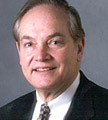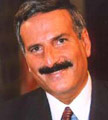
This story was updated on Tuesday, Oct. 7, to reflect recent events at City Hall.
UPDATE: New Yorkers have debated the subject for more than 15 years, but City Council members on Tuesday said the real conversation on whether or not term limits constitutes good government is now about to begin.
That discussion was sparked by the introduction of two bills -- one extends term limits from two to three terms, the other bans the council from acting on the issue and calls for any change to be approved only by a voter referendum.
The first bill (see our chart below on all of the term limit related legislation and where it stands) was introduced by the request of Mayor Michael Bloomberg and will -- along with several other pieces of legislation -- be sent to the council's Governmental Operations Committee for public hearings. The first of those hearings is scheduled for 3 p.m., Oct. 16.
| BILL NUMBER: | SPONSOR: | STATUS: | SUMMARY: |
| N/A |  Councilmember Oliver Koppell |
Been abandoned | The bill, requested in early September, has since been abandoned, Koppell said, because it's identical to the mayor's legislation, which was proposed a month later. It would have simply increased the city's term-limit cap from two to three terms. |
| Intro 845 |  Mayor Michael Bloomberg |
Introduced | Would permanently extend the city's term limit from two to three terms. |
| Not assigned yet, text available here |  Councilmembers Letitia James and Bill de Blasio |
Has not been introduced yet, but will have a hearing next week. | Would require the city set up a Charter Revision Commission to look into term limits and send the issue to voters. |
| Intro 850 |  Councilmember David Weprin |
Introduced | Prohibits the City Council from acting on term limits legislatively and requires any proposal on the issue be subject to a referendum. |
| Reso. 1640 |  Councilmember Tony Avella |
Introduced | Calls for the State Legislature to require any change in term-limit law be done by referendum. |
The first hearing will be dedicated for public comment. A subsequent hearing on Oct. 17 will include testimony from public officials.
While some members criticized how quickly the legislation has been introduced and scheduled for hearings -- saying it has been fast-tracked to stifle dissent -- Councilmember Simcha Felder, the chair of the committee, said hearings have been set up expeditiously so everyone can be heard.
"We want to make sure we act as expeditiously as possible to ensure the public has an opportunity to talk and an opportunity to be heard," said Felder. Because the issue could end up in court, Felder added, the council wants to act sooner rather than later, so it can be settled in time for the 2009 citywide election.
By most measures, the legislation swirling around City Hall has split the City Council. Based on the statements made at today's council meeting, members appear to be divided on whether they should extend term limits from within City Hall or send the item back to the voters during a special election.
Council Speaker Christine Quinn did not reveal whether she supports or opposes the measure to legislatively extend term limits. She said she, and her members, have not decided on the matter just yet.
"I am continuing to consult with my members," said Quinn. "I will be taking a position in the near future. I need to make sure I do enough consultation with my colleagues."
Supporters of extending term limits say it's the most democratic (small d) track, by giving the voters greater choice in 2009. After all, we have a representative democracy and representatives should act as they are charged: To vote on legislation for their constituents.
"We are representative government," said the council's Majority Leader Joel Rivera. "I think we should all recognize this for what it is: the return of democracy to the people."
Some of the proposal's most vocal opponents, however, say it subverts the will of the voters, who approved two-term limits in two separate referenda in the 1990s. Council members Bill de Blasio, Letitia James and David Weprin have introduced -- or will at the council's next meeting -- competing legislation, both of which, in some form or another, gives voters the final say on term limits. Councilmember Tony Avella introduced a resolution calling on the state legislature to approve legislation requiring that any change in term limit law be done by referendum.
"I hope and I pray that no one will try to railroad a bill through," said de Blasio, adding that never in the history of City Hall has a bill been pushed through so quickly. "I'd rather have a couple thousand citizens (vote in a special election), as opposed to 51 self interested people" -- his fellow council members.
For weeks, political observers and officials have mulled over how the city could change its current law -- which allows officials to serve only two consecutive terms.
Initially, it was thought the mayor would introduce a one-time only extension, in part because of billionaire (and the founder of the city's term limit movement) Ronald Lauder's support for it. Now, another deal may emerge that would place Lauder on a charter revision commission to review the term limit law in 2010, after the city's election.
If term limits are modified, the mayor, public advocate, comptroller, four borough presidents and 35 council members could seek another four-year term.
As opponents of extending term limits legislatively accused city leaders of fast-tracking the mayor's bill, others, even those that are undecided, said because the 2009 citywide election is fast approaching, potential candidates and term-limited officials need to move quickly so they can plan for their future.
All this could decide the 2009 election before November 2009.
"This is basically the mayoral election in the next two weeks," said Councilmember Peter Vallone, who is undecided on the bills.
In addition to the opposition voiced at the City Council, the Working Families Party also came out against a term limit extension by legislation today.
Original Story Below
Two hours after Mayor Michael Bloomberg announced he would seek a third term if city law was changed, a man sporting shiny sunglasses and a "Heil Bloomberg" cardboard sign marched in front of City Hall.
"No third term for the mayor," he said. "He should respect democracy."
Those sentiments have been echoed across the city. But imagine a different scenario.
Let's say the City Council approves a change in term limits - which they might do as soon as Oct. 23. The bill is scheduled for introduction tomorrow.
Fast-forward another 12 months and see Bloomberg clinching another four-year term (A Quinnipiac poll released last week found 54 percent favored Bloomberg over the other potential mayoral candidates).
Then what?
In what's certain to be a dour economic period, the mayor sworn in on Jan. 1, 2010 (no matter who he or she is) will have to make some tough choices. If that executive is our current one, what could New Yorkers expect from a third Bloomberg term?
Four More Years
After months -- make that years -- of back and forth about term limits and his plans for the future, Bloomberg announced on Thursday he would seek reelection if the City Council approved legislation upping the city's term limit from eight to 12 years.
He previously expressed "disgust" with the idea of extending term limits legislatively.
A few hours after the mayor's announcement, City Council Speaker Christine Quinn said the mayor would introduce legislation at the council's meeting tomorrow.
The council remains divided on the idea, and the Democratic caucus will meet this afternoon to try to hash out a majority position. But the legislation has one aspect that will appeal to many council members currently mulling their futures: It would also allow 35 members of the City Council, four borough presidents, the comptroller and public advocate -- all of whom are term limited -- to seek another four years in their current posts.
The extension of term limits, however, also would overturn two voter referendums from the 1990s, when the public overwhelmingly supported the two-term cap.
A change has the potential, given the amount of fundraising that has already commenced for higher office or from those who wanted to get into the council for the first time (a list of more than 90 candidates), to unravel a lot of plans for the 2009 election.
Is Bloomberg the Answer?
Bloomberg has hinged his potential candidacy on his ability to respond to the fiscal crisis. A product of Wall Street and head of Bloomberg L.P., the billionaire mayor has a history of management and economic accomplishments.
"My expertise is in pulling people together and tracking people and compensating them, getting (them) to work together and setting a work ethic," said Bloomberg on Thursday after he dismissed being an advisor to the next administration. He points to his record: He paid down debt, contributed to the city's public health fund and cut spending.
While Bloomberg may have the so-called "perfect" resume to respond to the looming fiscal tumult, he may not have the power.
"A mayor has very limited control over the forces that affect a local economy, especially in a city like New York that's so affected by its neighbors and the world," said Doug Turetsky of the Independent Budget Office. "It's going to be a difficult period and whoever comes in will likely face some serious challenges."
Bloomberg has had to face tough times before. When he first came to office in 2002 with the city reeling from economic downturns and the effects of the 9/11 attacks, he raised taxes 18 percent -- the first time property taxes saw a hike in a decade -- and slashed spending. Turetsky called Bloomberg's response to the first recession of the decade "pragmatic and un-ideological."
Bloomberg also, at that time, pledged to never leave his predecessor in a similar fiscal situation. His eagerness to take on a third term now may be an attempt to fulfill that promise.
An Economic Response
The mayor's announcement and the editorial endorsements from the city's three major dailies that preceded it led to a feeling among many New Yorkers that the whole thing was, if not a plot, a series of carefully orchestrated events. Some said the mayor based his decision on the opinion of several billionaires and near billionaires, rather than on the will of the people.
"The mayor only consulted an oligarchy in the city of New York of millionaires and billionaires," said Councilmember Letitia James, who plans on introducing legislation with Councilmember Bill de Blasio that would require any change in term limits be studied by a charter revision commission.
Bloomberg's widespread support from the city's business elite, some say, is a sign that Bloomberg may be the best choice to handle a fiscal crisis. But some political experts question whether his credentials really would put him at an advantage to deal with the downturn more effectively than any other potential candidate for mayor in 2009.
"If you say, 'I come from Wall Street and therefore I know how to manage the economy' -- well, some people will say, 'Look at what Wall Street has done to this country,'" said J. Phillip Thompson, a professor at MIT and member of the Dinkins administration. "The important thing about democracy is to build strong institutions. If no one else can lead this city, maybe he didn't do such a great job of building the institutions in this city."
Thompson supports term limits.
Beyond that, some of the city's experts do not commend Bloomberg for the first two terms. Policies in the third term would need some revisions, said Nicole Gelinas, a senior policy analyst at the Manhattan Institute.
"The mayor has not made substantive progress during most of this two terms on any of the long-term issues that bedevil the budget," said Gelinas, referring to pensions, health care costs and the city's debt. "These are things that he calls uncontrollable costs."
Those expenses, Gelinas said, have increased 57 percent during the Bloomberg administration and now make up 40 percent of the total budget. Bloomberg may not have had control of these costs during his first term, but by his second he should have been using his leverage to reduce them, she added.
"These are only uncontrollable now because the mayor has chosen not to control them," Gelinas said.
Bloomberg deserves some criticism for letting the city depend so much on Wall Street, according to Jonathan Bowles, executive director of the Center for an Urban Future. Bloomberg could have made steps to diversify the economy, Bowles said, but instead he relied too much on the financial sector, thus setting the city up for serious consequences when Wall Street stumbled. Approximately 20 percent of the city's revenue is attributed to Wall Street.
"For the most part, we're extremely dependent on the financial services sector, but that's something that gets us in trouble," said Bowles. "I don't think diversifying the economy was as high a priority in his economic development strategy as some of his real estate development."
A lot of that real estate development, a hallmark of Bloomberg's first two terms, said city experts, could be put on hold because of the economy. That leaves many wondering what Bloomberg would focus on if he were given four more years.
The Reform Agenda
Bloomberg's appeal is in his steady hand and his candor, observers say. He has been typically seen as an outsider open to reform and transparency.
That perception could be tainted, and for some even destroyed, in a third term, because of Bloomberg's decision to revise term limits. While Bloomberg has pushed campaign finance reform and government transparency, observers say his latest gambit means Bloomberg will no longer be known as the reform mayor.
"It rips his reputation as a reformer to shreds," said Gene Russianoff of the New York Public Interest Research Group. "I think history will be very unkind to the mayor."
Good government groups in the city, including Citizens Union -- the sister organization to Gotham Gazette's publisher -- have called for a special election to decide term limits, instead of legislation. Many have equated the legislation as a run around the voters and have called it self-serving.
Those groups, though, have said if Bloomberg won another term, they would still want to work with him.
"This is a significant disagreement," said Dick Dadey, executive director of Citizens Union. "But I hope that, win or lose, that we both will be able to work together like we have in the past."
Placing Bets
There is no guarantee the City Council will approve the legislation. And there is no guarantee that even if the legislation is approved, that the mayor will win reelection.
Many in the city, from labor unions to nonprofits to academics, have expressed real concern about extending term limits inside City Hall, without going to the ballot box.
"Given that the voters have so clearly spoken, I find it problematic at the very least that Mayor Bloomberg and the City Council would seek to operate this way," said Bruce Berg, a political science professor at Fordham University.
While the City Council is known for following the administration's lead and its speaker, Christine Quinn, is a close ally of the mayor, several members -- from John Liu to de Blasio to David Weprin to Melissa Mark Viverito -- have said they would vote against the bill.
"Some believe we have been co-opted by the mayor of the city of New York and we are not exercising our constitutional right and that explains why two in five New Yorkers live in poverty," said James, who pledged to vote against the bill. "We as members of the City Council really need to flex our muscles."
Â




